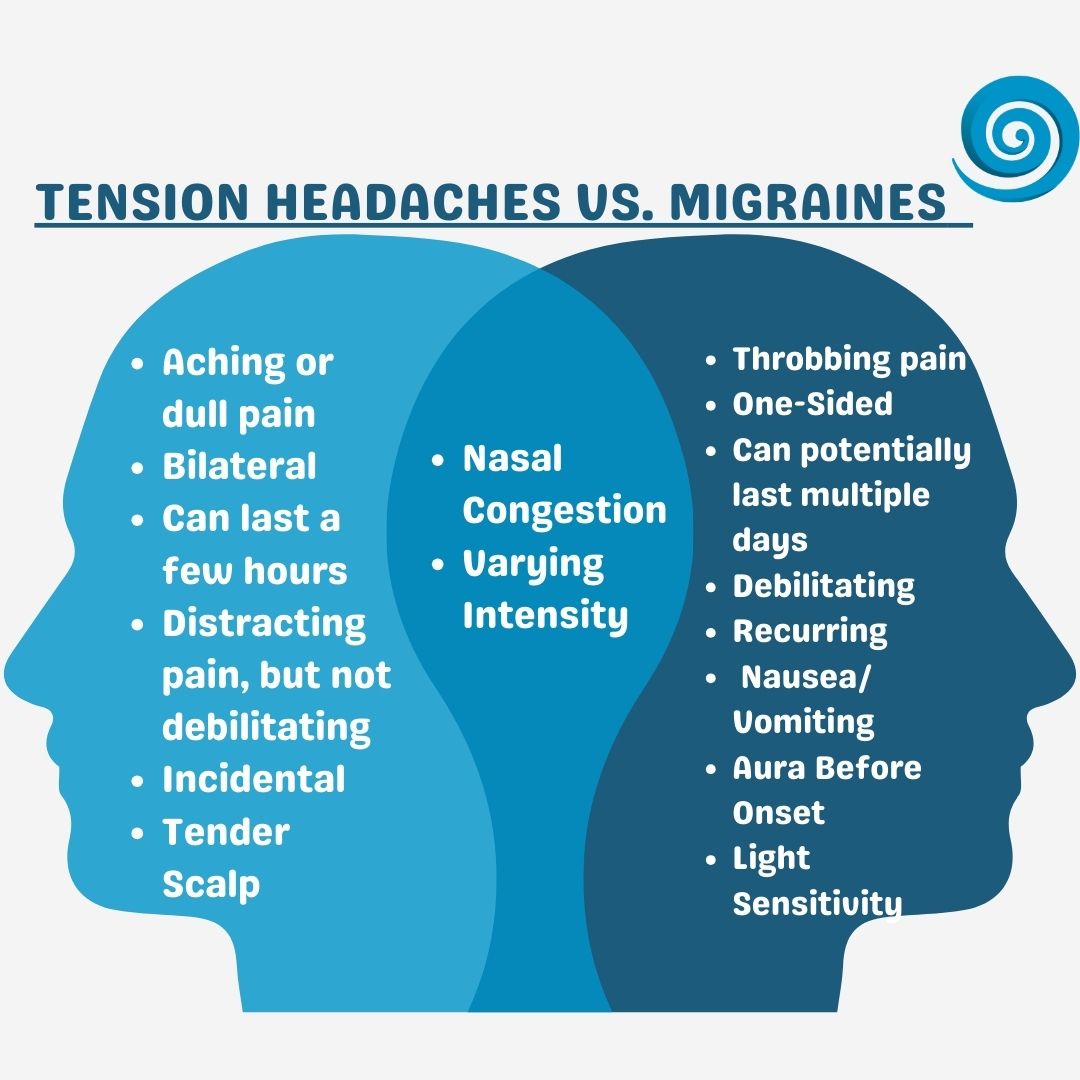Tension Headaches vs Migraines
In the realm of headaches, two prevalent contenders often steal the spotlight: tension headaches and migraines.
These two adversaries can
wreak havoc on one’s day, causing discomfort and disruption. But what sets them apart, and how can we differentiate between the two? Let’s delve into the nuances of tension headaches and migraines, exploring their causes, symptoms, and management strategies.
Many people have never heard of NUCCA care or even that Chiropractic can help with headaches and migraines. If you already see the connection between the spine and your head pains we should consult as I have great results with both tension headaches and migraines.
Tension Headaches; can they be cured?
Tension headaches are the most common type of headache experienced by people worldwide. They often manifest as a dull, aching pain that wraps around the head like a tight band. While the exact cause can remain elusive, tension headaches are often attributed to muscle tension in the head, neck, and shoulders, possibly triggered by stress, poor posture, or eye strain.
Symptoms:
- Mild to moderate, constant pressure or tightness around the head
- Tenderness in the scalp, neck, or shoulders
- A sensation of a tight band encircling the head
- Generally bilateral (affecting both sides of the head)
- Rarely accompanied by other symptoms like nausea, vomiting, or sensitivity to light and sound
Management:
- Over-the-counter pain relievers like ibuprofen or acetaminophen can alleviate symptoms.
- Stress management techniques such as relaxation exercises, meditation, or yoga may help prevent tension headaches.
- Improving posture (AKA Forward Head Posture, we can help correct that too, learn more here) and taking frequent breaks from prolonged sitting or screen time can reduce the frequency and severity of tension headaches.
- Chiropractic care, specifically NUCCA care, focused on the cervical spine with gentle and specialized adjustments…not the kind you’ll find on TikTok where they are trying to rip the person’s head off!

Migraines: What’s causing them?
Migraines, on the other hand, are a neurological disorder characterized by recurrent moderate to severe headaches often accompanied by other symptoms. They can be debilitating, significantly impacting daily activities and quality of life. Migraines are believed to involve a complex interplay of genetic, environmental, and neurochemical factors.
Symptoms:
- Intense, throbbing, or pulsating pain, often unilateral (affecting one side of the head)
- Nausea, vomiting, or both
- Sensitivity to light, sound, and sometimes smells
- Visual disturbances, such as aura (flashes of light, blind spots, or zigzag lines) in some cases
- Symptoms can last for hours to days and may worsen with physical activity
Management:
- Medications such as triptans, NSAIDs, or anti-nausea drugs may help relieve migraine symptoms.
- Lifestyle modifications, including regular sleep patterns, hydration, and stress management, can reduce migraine frequency and severity.
- Keeping a migraine diary to identify triggers and patterns can aid in preventive strategies.
- In some cases, preventive medications may be prescribed for individuals with frequent or severe migraines.
- NUCCA chiropractic care has been shown to get great results with Migraines, in fact here’s a great study to show the objective results.
Differentiating Between the Two
While tension headaches and migraines share some similarities, several key differences can help distinguish between them:
- Pain Quality: Tension headaches typically present as a steady, dull ache, while migraines often involve intense, throbbing pain.
- Associated Symptoms: Migraines are often accompanied by nausea, vomiting, and sensitivity to light, sound, or smells, which are less common in tension headaches.
- Duration and Frequency: Tension headaches tend to be shorter in duration and less frequent than migraines, which can last for hours to days and occur with varying frequency.
- Triggers: While stress can exacerbate both tension headaches and migraines, migraines may have additional triggers such as certain foods, hormonal changes, or environmental factors. I find that the triggers are just stimuli that cause people to go over the “tipping point” symptomatically, the same “triggers” will often have no effect on a patient after we correct their cervical spine alignment!
Navigating the Headache Landscape; Is There a Natural Longterm Solution for Your Head Pain?
In the battle between tension headaches and migraines, understanding the nuances of each can empower individuals to manage their symptoms effectively. Whether it’s practicing stress management techniques, identifying triggers, or seeking chiropractic or medical intervention when needed, there are various strategies available to alleviate the burden of headaches. I’ve been fortunate to help hundreds of people minimize or completely stop their headaches completes using my unique Corrective Care approach which you can learn more about here.
If you sense a strong connection between your neck, head, and shoulders during tension headaches or migraines, there’s a good chance specific types of spinal adjustments could help you tremendously. I’d love to consult with you if you think that is the case and we can see if Chiropractic Corrective Care is the right fit for you and your goals.
